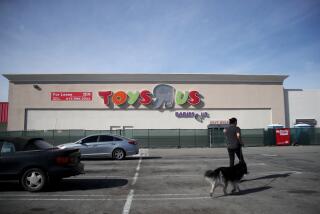Humble Firm Rises From Ruined Drexel
- Share via
NEW YORK — No hostile takeovers. No junk-bond financings. No predators’ ball.
Drexel Burnham Lambert is dead. Long live Drexel Burnham Lambert.
The company succeeding the fallen Wall Street power won’t be able to raise billions with a couple of phone calls. It won’t overpower its rivals. It won’t attract the industry’s hottest investment bankers.
“If we weren’t Drexel, nobody would even be interested in it,” said John F. Sorte, president and chief executive of Drexel, which fades into history next month, to be replaced by a tiny entity called New Street Capital Corp.
New Street will have 40 employees, compared to Drexel’s 10,500 at its peak. New Street will have $415 million in assets, compared to billions during Drexel’s heyday.
The firm’s main job will be to manage Drexel’s unmarketable assets--mostly soured junk-bond investments from the late 1980s--to generate additional cash for bankruptcy court creditors.
But New Street also plans to invest in other “workout” situations--buying the bonds of financially distressed companies to play a role in their revival. If the companies’ performance improves, so will the value of the securities.
Drexel was the industry’s main peddler of risky high-yield bonds to corporate America. Now the firm’s successor, as well as other former Drexel executives at other firms, hope to profit from rescuing the deals they engineered.
Untainted by Drexel’s criminal imbroglio, Sorte, 44, a 12-year Drexel veteran and former co-head of investment banking, was persuaded to head the firm after it filed for bankruptcy protection in February, 1990.
The firm’s Chapter 11 reorganization plan was approved by a federal judge earlier this month and is to be consummated on April 27. After that, New Street officially begins operations.
Sorte says the name was picked to reflect a “new direction” for Drexel after six years of turmoil since it was linked to criminal wrongdoing by its former star, junk bond financier Michael Milken. Drexel pleaded guilty to six felonies in 1989.
Drexel-New Street still operates out of Drexel’s old headquarters at 60 Broad St. in Manhattan’s Wall Street quarter, just down the block from the New York Stock Exchange. (The building’s back door opens onto New Street, but Drexel officials said that was a coincidence.)
The firm occupies three floors now--down from 25--and life there is Spartan. Many walls and bookshelves are bare. Sorte and other top executives work out of cubicles, not offices. The corporate dining room is long gone.
Boxes stuffed with documents surround desks. Filing cabinets are labeled with adhesive yellow notes, a memory chest of old Drexel deals: “American Capital to Continental,” “Maxxam to Memorex.”
What New Street can and can’t do was determined in negotiations with federal officials and creditors.
The firm is barred from underwriting securities or conducting private placements of stock or bonds. It can’t raise money for outsiders to invest. Hostile takeovers, for which Drexel was famed, are verboten . And New Street can’t do business with Milken, who is now in prison.
The Federal Deposit Insurance Corp., a major Drexel creditor, interviewed New Street executives to make sure they weren’t linked to any wrongdoing. Executives were grilled about their relationship with Milken.
“They didn’t want the reorganized Drexel to bear any resemblance to what Drexel did,” Sorte said.
So New Street will focus on managing Drexel’s existing holdings--about 40 positions in 40 companies. As a bondholder, Drexel has already sat on 19 bankruptcy creditor committees and holds large positions in about 10 companies.
For instance, Drexel owns hundreds of millions of dollars in debt and two board seats of JPS Textile Group Inc., a failed leveraged buyout from the late 1980s. Other large holdings include junk bonds of West Point-Pepperell Inc., Gillette Holdings and Memorex Telex Corp.
New Street, which plans to move to new offices in mid-town Manhattan, will be owned by a trust created in Drexel’s bankruptcy that is liquidating its more marketable securities. The firm will hand over 40% of its profits to the trust for distribution to creditors.
More to Read
Inside the business of entertainment
The Wide Shot brings you news, analysis and insights on everything from streaming wars to production — and what it all means for the future.
You may occasionally receive promotional content from the Los Angeles Times.









